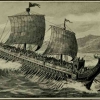Nietzsche, F. (1886). Beyond Good and Evil. Leipzig: C.G. Naumann.
-- For the critique of morality, hierarchy, and the human will to power that underpins the essay's exploration of vanity and ambition.
Camus, A. (1942). The Myth of Sisyphus. Paris: Gallimard.
-- A key existential source on the absurdity of human striving and the paradox of meaning in incompleteness.
Bourdieu, P. (1984). Distinction: A Social Critique of the Judgement of Taste. Cambridge, MA: Harvard University Press.
-- For the sociological framework explaining how beauty, popularity, and wealth form an interconnected system of symbolic capital.
Han, B.-C. (2015). The Burnout Society. Stanford, CA: Stanford University Press.
-- For insights into self-exploitation, the illusion of autonomy, and the cultural pathology of achievement.
Fromm, E. (1956). The Art of Loving. New York: Harper & Row.
-- For the discussion of human need, dependence, and the illusion of self-sufficiency as moral weakness.
Arendt, H. (1958). The Human Condition. Chicago: University of Chicago Press.
-- On the dynamics between labor, work, and action as reflections of human incompleteness.
Kierkegaard, S. (1843). Fear and Trembling. Copenhagen: C.A. Reitzel.
-- For the existential tension between faith, dependence, and the impossibility of perfection.
Prigogine, I. & Stengers, I. (1984). Order Out of Chaos: Man's New Dialogue with Nature. New York: Bantam Books.
-- For the scientific-philosophical grounding of asymmetry and self-organization as natural expressions of balance through imbalance.
Sloterdijk, P. (2013). You Must Change Your Life. Cambridge: Polity Press.
-- For the idea of human self-transformation as a never-ending asymmetrical exercise.
Simone Weil. (1952). Gravity and Grace. London: Routledge.
-- For the spiritual argument that deprivation, not abundance, reveals the divine justice of existence.
Bauman, Z. (2000). Liquid Modernity. Cambridge: Polity Press.
-- On how modernity transforms dependency and incompleteness into shame and commodified desire.







